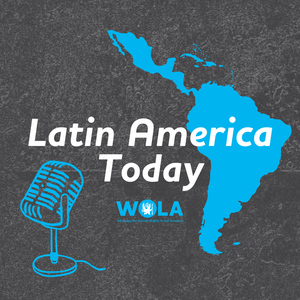Global Drug Policy: “Countries are being freed up to actually speak their minds”
For the second year in a row, what had been an uneventful, consensus-driven United Nations meeting on drug policy saw unexpected drama and signs of real change. At the 68th session of the UN Commission on Narcotic Drugs (CND) in Vienna in March 2025, governments approved the formation of an independent expert commission to recommend changes to the architecture of global drug policy, which has changed little since the early 1960s. Colombia again played a catalytic role, as it did in 2024. But this time, the United States—under the new Trump administration—tried to block nearly everything, isolating itself diplomatically in the process. In this episode of the WOLA Podcast, Adam Isacson speaks with three experts who were in Vienna: Ann Fordham, Executive Director of the International Drug Policy Consortium (IDPC), a network of 195 organizations working to reform global drug policy. Isabel Pereira, Senior Coordinator for drug policy at DeJusticia, a Bogotá-based think tank and advocacy group. John Walsh, WOLA’s Director for Drug Policy, who has tracked the UN’s drug control system since the 1980s. The conversation traces the slow evolution of the UN drug control system—from decades of punitive consensus to today’s shifting coalitions, unprecedented votes, and long-overdue reviews. Much of the episode centers on a breakthrough: a new resolution establishing an “independent external review” of the UN’s own drug control institutions. For years, countries like Colombia have called for an honest assessment of the system’s failings. Now, thanks to a resolution spearheaded by Colombia and passed over U.S. opposition, that review is happening. The details still matter: how independent the expert panel will truly be, who funds it, and whether the review can influence the hard architecture of the drug control treaties. “Vienna was very much a space where delegates would just pat each other on the back on how well we’re doing the war on drugs,” Pereira said. “The spirit of Vienna created a sort of lockdown situation on debate, true debate,” added Walsh. “Civil society enlivened the Vienna atmosphere” in recent years, he noted, “with new debates, new arguments.” Now, this international space has become more dynamic. The guests also discuss coca leaf: its decades-old listing as a Schedule I narcotic, Bolivia’s and Colombia’s ongoing push for a scientific review, and the possibility of a pivotal vote in 2026. They stress how traditional knowledge—especially from Indigenous communities—must be recognized as legitimate scientific input during that review. Underlying it all is a major diplomatic shift. Colombia is using the UN system to demand drug policy grounded in health, human rights, and development—not militarized prohibition. But with Petro’s term ending in 2026, it’s unclear who will pick up the baton. Meanwhile, the Trump administration is signaling a return to zero-tolerance drug war policies—and burning bridges with potential allies in the process. “They behaved so terribly. I mean, they broke with all diplomatic niceties,” said Fordham. “The U.S. just went for it in their opening statement… It was frankly an embarrassing, but also pretty shocking statement.” Despite the uncertainty, all three guests agree: civil society is no longer on the sidelines. NGOs and experts are shaping debates, challenging rigid thinking in Vienna, and holding governments to account.
